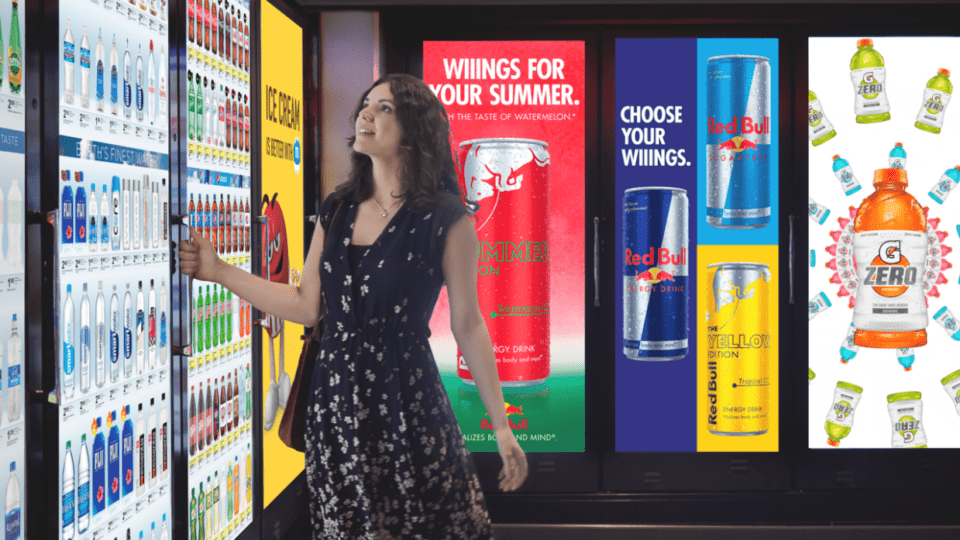In-store digital media startup Cooler Screens is suing Walgreens, previously one of the highest-profile adopters of its technology, which integrates smart screens onto cooler doors to power in-store advertising. Cooler Screens is seeking $200 million for breach of contract and wants to prevent the retailer from removing the screen technology from its stores.
A detailed timeline released by Sitrick and Company, the law firm representing Cooler Screens, outlined the deterioration of the companies’ relationship, which began in 2017 under former Executive Chairman and CEO Stefano Pessina. According to Cooler Screens’ account, all was going well in the initial years of the arrangement, which included a successful three-month pilot in 2018 at six locations, followed by plans to expand to 2,500 stores. However, the lawsuit asserts that those plans began to fall apart in 2021 when current CEO Rosalind Brewer took over and “decided she did not like how the screens looked and she wanted them out of the stores.”
In a further wrinkle, Cooler Screens was co-founded by Walgreens’ former Chairman, CEO and Board member Greg Wasson, who led the retailer from 2009 to 2014. As current Chairman of Cooler Screens, Wasson was central to the negotiations with Walgreens and is now a named litigant in the complaint against his former company.
In-store activations are widely seen as the next big area of opportunity in the burgeoning retail media sector, and Cooler Screens has been one of the biggest players bringing this technology to life in stores to date. The company also has agreements in place with Kroger and Circle K.
Because the investment required to put these new technologies in place can be hefty, many startups in the space operate under retailer tradeoffs; for example, the technology company takes on the CapEx costs of integrating the new devices in exchange for revenue shares on the advertising, explained Andrew Lipsman, Principal Analyst for Retail and Ecommerce at Insider Intelligence in a conversation earlier this year with Retail TouchPoints. Lipsman is a major proponent of in-store retail media and also worked briefly at Cooler Screens in 2021.
Specific financial details of Cooler Screens’ arrangement with Walgreens have not been disclosed, but in the complaint Cooler Screens says that it agreed to invest $200 million in the technology and deployment for the 2,500-store rollout.
Walgreens officially terminated its agreement with Cooler Screens in February 2023, according to the Chicago Tribune, at which point Cooler Screens claims that fewer than one-third of the smart doors called for in the agreement had been installed. Time reports that Cooler Screens claims to have spent $45 million making and installing doors in the first 700 stores, $88 million on doors that haven’t been installed and more than $100 million on third-party vendors.
Cooler Screens is seeking injunctive relief to prevent Walgreens from removing the smart door technology that is installed, and compensatory damages of $200 million for breach of contract.
The lawsuit alleges that because Walgreens could not legally terminate its existing contract in 2021, the company instead “began a concerted effort to obstruct Cooler Screens’ performance, fabricate and declare bogus breaches of the agreement, and force Cooler Screens to remove the screens and technology from the Smart Doors.” Among the examples listed in the complaint of this alleged behavior by Walgreens executives are: halting expansion plans, refusing to provide timely approvals, halting data sharing that was required under the agreement, blocking ads that Cooler Screens says it was permitted to display and “falsely claiming” that the doors were experiencing flickering, blurred, frozen or distorted images, and even in some cases producing sparking, smoke and/or fire as well as not displaying pricing.
In response to the latter three complaints, Cooler Screens says it worked with manufacturer Dover and safety science company UL to assess the smart doors for performance and safety issues, with both firms finding no safety issues and in some cases finding that issues were actually a result of the poor state of Walgreens’ refrigerators and freezers. As proof of this, Cooler Screens points out in the complaint that “Walgreens’ refrigeration infrastructure was so antiquated, broke so often and took so long to repair that Cooler Screens came up with digital signage to help Walgreens communicate these failures to its customers.”
“We are disappointed that Cooler Screens is falsely claiming that anything other than their failure to perform was the basis for the termination of our contractual relationship,” said a Walgreens spokesperson in a statement shared with Retail TouchPoints. “The claims and allegations in Cooler Screens’ complaint are baseless and unfounded. Safety, customer experience and meeting revenue goals are a priority for our company. Cooler Screens failed to meet its contractual obligations, and the decision to terminate the contract was based on our experience with Cooler Screens.”
Walgreens has been under some financial pressure recently, following its $230 million settlement with the City of San Francisco for its role in the sale of opioids. It also is paying $4.95 billion over 15 years as part of settling nationwide opioid suits brought by states, local governments and tribes. In May 2023, the company announced plans to lay off 10% of its corporate workforce, although it denied that the cutbacks were connected to these financial liabilities.













